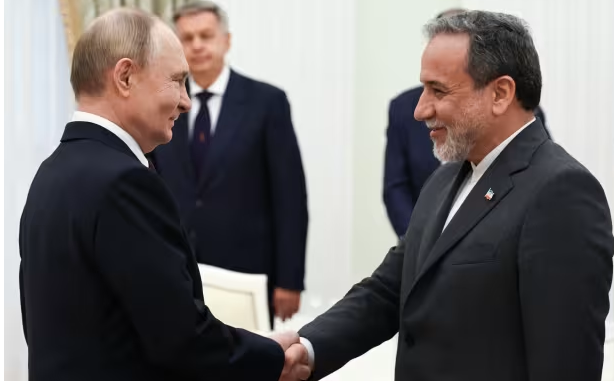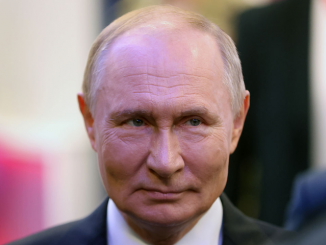
Russian President Vladimir Putin and Iranian Foreign Minister Abbas Araghchi shake hands during a meeting at the Kremlin in Moscow on Monday. (Photo by ALEXANDER KAZAKOV/POOL/AFP via Getty Images)
| Published June 23, 2025
In the wake of recent U.S. airstrikes on Iran’s nuclear infrastructure, Iranian Foreign Minister Abbas Araghchi arrived in Moscow on June 23, 2025, seeking stronger support from Russia. Carrying a personal message from Supreme Leader Ayatollah Ali Khamenei, Araghchi urged Russian President Vladimir Putin to take a more decisive role in countering U.S. aggression. The visit comes amid heightened regional tensions and reflects Iran’s strategic push to deepen ties with its key ally while pressing for more than symbolic gestures. Moscow responded with condemnation of the U.S. attack and reiterated its readiness to assist Iran, though it stopped short of offering military support.
🕊️ What Putin and Moscow Have Pledged
-
Strong diplomatic condemnation: Putin labeled the U.S. strikes as an “absolutely unprovoked aggression” and “unjustified,” pledging to “make efforts to assist the Iranian people”.
-
Mediation offer: Kremlin spokesman Dmitry Peskov emphasized that Russia would act based on “what Iran needs,” pointing to a formal offer to mediate and de-escalate the crisis.
-
Cautious approach: Despite condemning the U.S., Moscow has made no military commitment; their January 2025 strategic treaty lacks a mutual defense clause, and officials noted that any support is contingent and non‐military.
🛠 What Russia May Provide
-
Diplomatic backing on international platforms and vocal opposition to U.S. actions.
-
Mediation services to help manage or de-escalate the crisis—possibly via negotiations with the U.S. or regional entities.
-
Technical or civilian support, particularly tied to the existing nuclear cooperation framework—not frontline military aid.
-
Unspecified contingent support, “depending on what Tehran requests,” according to Peskov.
🧭 Why It Matters
-
The visit underscores Iran’s dissatisfaction with Russia’s current level of support and its desire to leverage that strategic partnership into more concrete assistance—whether diplomatic, technical, or otherwise.
-
But Russia remains reluctant to escalate militarily. It’s carefully balancing its own strategic interests—especially its ongoing war in Ukraine and global relations—while maintaining a role as a mediator and veto-power in international forums .
 Tensions Breakdown: A Strategic Analysis
Tensions Breakdown: A Strategic Analysis
1. Key Takeaways
-
Putin’s Warning: Signals rising global instability, possibly aimed at deterring further U.S. actions.
-
Iran’s Outreach to Russia: Indicates Tehran is seeking stronger diplomatic and military backing.
-
Russia’s Promise to Help: Deepens the anti-U.S. bloc and signals a more coordinated front between Moscow and Tehran.
2. What This Signals Geopolitically
-
For the U.S.: A test of deterrence credibility and global leadership.
-
For Russia & Iran: A chance to showcase unity and test U.S. resolve.
-
For the World: Heightened risk of regional war, oil price volatility, and further erosion of international norms.
3. Potential Implications
-
Escalation Risk: Greater likelihood of proxy wars or direct conflict in the Middle East.
-
Strategic Realignments: Other countries may reconsider alliances or pursue neutrality.
-
Energy Markets: Fear-driven spikes in oil prices, inflation pressure globally.
4. Underlying Power Moves
-
Russia: Positioning as global defender against U.S. aggression.
-
Iran: Using Russia to balance isolation and increase bargaining power.
-
U.S.: Likely to face international criticism or support depending on outcomes and narrative control.
 Bottom Line:
Bottom Line:
Araghchi’s visit is a high-stakes diplomatic maneuver: Tehran is signaling that Moscow needs to move beyond symbolic condemnation and provide tangible support. So far, Russia has responded with strong rhetoric, diplomatic backing, mediation offers, and promises to tailor assistance to Iran’s needs—but no military commitments. The outcome now depends on whether Putin sees value in deeper involvement or continues prioritizing restraint.
SOURCES: REUTERS – Putin says US strikes on Iran are pushing world to ‘very dangerous line’
BARRONS- Iranian Foreign Minister Arrives in Russia to Consult Putin
USA TODAY – Putin said Russia would help Iran after US attack





Be the first to comment